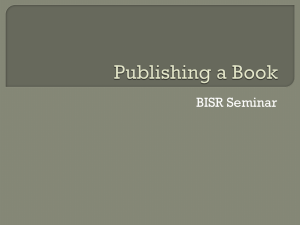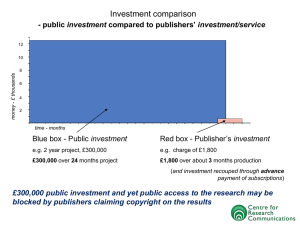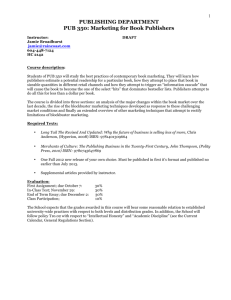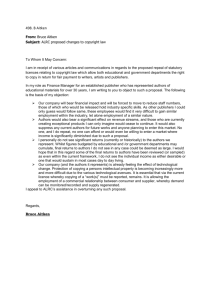summary
advertisement
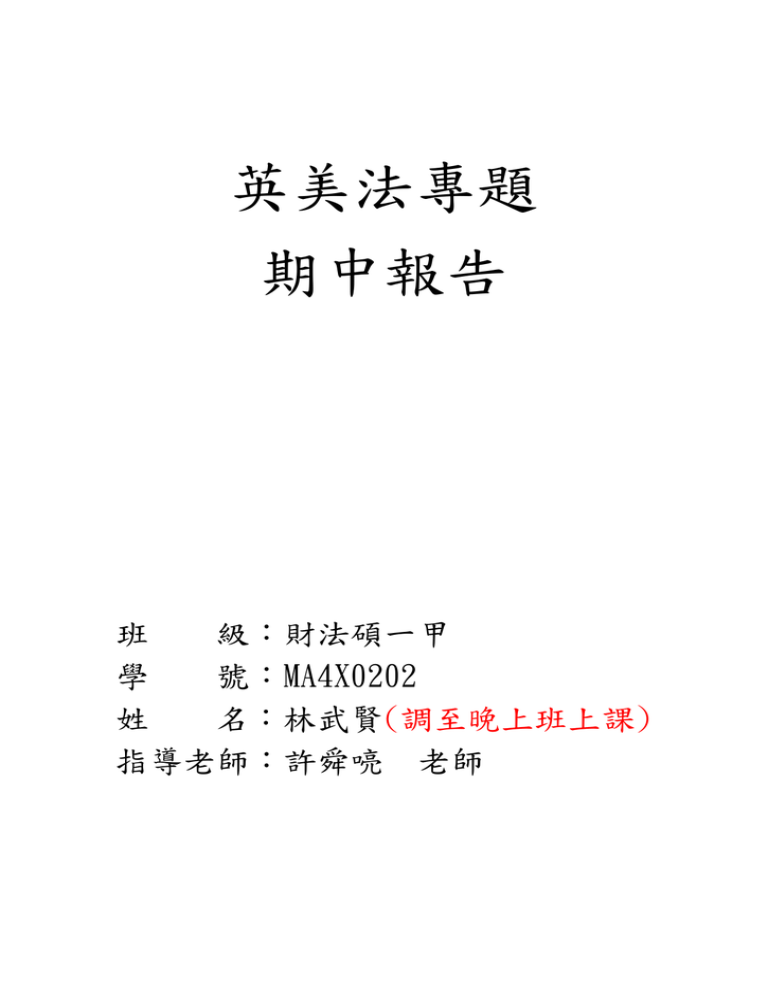
英美法專題 期中報告 班 級:財法碩一甲 學 號:MA4X0202 姓 名:林武賢(調至晚上班上課) 指導老師:許舜喨 老師 NEW YORK TIMES COMPANY, INC., ET AL. v. JONATHAN TASINI, ET AL. No. 00-201 SUPREME COURT OF THE UNITED STATES 533 U.S. 483; 121 S. Ct. 2381; 150 L. Ed. 2d 500; 2001 U.S. SUMMARY: Between 1990 and 1993, six freelance authors contributed articles in which they had registered copyrights to periodicals published by print publishers. Under agreements with the print publishers, but without the freelancers' consent, electronic publishers copied the articles appearing in the periodicals, including the freelancers' articles, into computer databases that contained thousands or millions of files with individual articles from thousands of collective works, either in one series or in scores of series. Users of the databases, which resided either on CD-ROMs or on the electronic publisher's central discs, could search for articles by author, subject, date, publication, headline, key term, words in text, or other criteria, or, in the case of the CD-ROMs, by means of an index. Whether written by a freelancer or periodical staff member, each article was presented to, and retrievable by, a database user in isolation, clear of the context the original print publication presented, although in one of the CD-ROM products--which was image-based rather text-based--an article appeared with the other materials published on the same page or pages, but without any material published on other pages of the original periodical. In 1993, the freelancers filed a civil action in the United States District Court for the Southern District of New York, alleging that their copyrights were infringed when, as permitted and facilitated by the print publishers, the electronic publishers placed their articles in the databases. The District Court granted summary judgment for the publishers, holding that 17 USCS 201(c) shielded the database reproductions, as (1) the privilege conferred upon owners of copyrights in collective works by 201(c) was conveyed from the print publishers to the electronic publishers, and (2) the databases reproduced the freelancers' works as part of a revision of a collective work (972 F Supp 804). The freelancers appealed, and the United States Court of Appeals for the Second Circuit reversed, granting summary judgment for the freelancers on the ground that the databases (1) were not among the collective works covered by 201(c), and specifically (2) were not revisions of the periodicals in which the articles first appeared (206 F3d 161). Fact: Petitioners, print and electronic publishers, challenged the judgment of the United States Court of Appeals for the Second Circuit that they infringed the copyrights of respondent freelance authors by placing authors' articles in electronic databases. Publishers asserted they were protected by the reproduction and distribution privilege accorded collective work copyright owners by 17 U.S.C.S. § 201(c) Issue: The Supreme Court held that the databases reproduced and distributed articles standing alone and not in context, not as part of the collective work to which the author contributed, or as part of any revision thereof, or as part of any later collective work in the same series under § 201(c). The authors had registered the copyrights for each article, while the print publishers registered collective work copyrights in each periodical edition in which an article originally appeared. The electronic publishers' databases did not reproduce and distribute the articles as part of either the original edition or a revision of that edition. An article's mark of origin did not mean the article was reproduced or distributed as part of the periodical. Unlike microforms, the databases did not reproduce articles as part of the collective work or as part of any revision. Media neutrality protected authors' rights to the extent the articles were presented individually within the databases. The storage and retrieval systems effectively overrode authors' exclusive rights. The electronic publishers were not selling equipment; they sold copies of the articles. Holding: The judgment of the court of appeals was affirmed.( Reproduction of freelance authors' magazine and newspaper articles in computer databases, without authors' permission, held to infringe authors' copyrights and not to be privileged under 17 USCS 201(c).) Rationale: They contend, however, that reproduction and distribution of each Article by the Databases lie within the "privilege of reproducing and distributing the [Articles] as part of . . . [a] revision of that collective work," § 201(c). The Publishers' encompassing construction of the § 201(c) privilege is unacceptable, we conclude, for it would diminish the Authors' exclusive rights in the Articles. But the markings do not mean the article is currently reproduced or distributed as part of the periodical. The Databases' reproduction and distribution of individual Articles -- simply as [*501] individual Articles -- would invade the core of the Authors' exclusive rights under § 106. 9 We conclude that the Electronic Publishers infringed the Authors' copyrights by reproducing and distributing the Articles in a manner not authorized by the Authors and not privileged by § 201(c). We further conclude that the Print Publishers infringed the Authors' copyrights by authorizing the Electronic Publishers to place the Articles in the Databases and by aiding the Electronic Publishers in that endeavor. We therefore affirm the judgment of the Court of Appeals.

